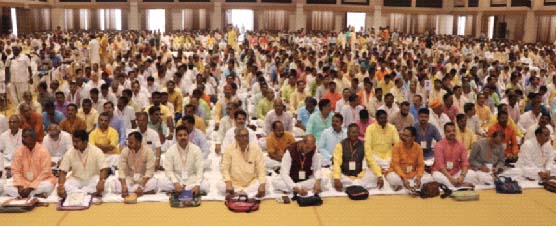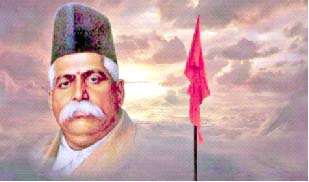Hundred years of the Rashtriya Swayamsevak Sangh are on the horizon and one can feel a sense of urgency in the organisation’s actions to fulfil the vision of its founder, Dr Keshav Baliram Hedgewar, that the RSS should not be an organisation in the society, but an organisation of the society. His stated aim was to organise the society and not create another organisation in the society. It has been a long journey, and the journey has not been easy. The past century has seen huge and dynamic changes nationally and globally. To keep the ship on course in those turbulent waters, building an organisation that seeps into virtually every cell of the humongous multi-hued Virat Purush that is Bharat, as described by Maharshi Aurobindo and Shri Guruji, has been an achievement that many social scientists refuse to see and acknowledge.
The period when RSS was established, also saw the birth of other organisations and movements. Most important of them being the Communist Party of India and Socialist movement. Both stand splintered and have lost their vitality. The Indian National Congress, the all-inclusive vehicle for independence struggle too has mutated many a times and is now a dilapidated shell of an organisation. However, the RSS has kept on renewing and evolving itself. In my book, RSS – Its Evolution From an Organisation to a Movement, I have expanded on this theme. There have been many additions and iterations in its working to achieve the goal of building a united strong society to build a prosperous Bharat. However, the philosophy that this is a Hindu Rashtra and Hindutva is the sap, the prana, that has kept this ancient banyan tree of Hindu civilisation alive with vital energy, remains uncompromised.
I talked of a sense of urgency because Dr Hedgewar did not intend to celebrate silver or golden jubilee of the organisation and had famously said in Marathi “we will see an independent, united and prosperous Bharat with these very eyes and this very physical body.” Balasaheb Deoras too had reiterated this view. However, it has taken four to five generations of self-sacrificing unsung millions to come to this stage where its vision is now shared by common citizens of our society. The RSS leadership feels that this vision needs to be fulfilled before the RSS completes 100 years of this journey. Hence, the goals for coming two years are more ambitious and all pervasive.
In its statement in the recently concluded Akhil Bharatiya Pratinidhi Sabha (ABPS) or All India Delegates Conference, the RSS says that it “aims to bring transformation through social harmony, family values, ecological conservation, Swadeshi (Bharatiya) conduct, and awareness about civic duty. It believes that sewa or service and family education about Bharatiya values is not possible without the help of women.”
The meeting concluded with a resolution that national resurgence that we witness today needs to be taken to its logical conclusion based on the spirit of Swa that is ‘selfhood’; a nation built on Bharatiya knowledge, Bharatiya philosophy, not copying any other nation’s march.
The RSS realises that mere economic wellbeing does not guarantee a healthy society. We need to make special efforts for achieving the objectives such as strengthening the family institution, creating fraternity-based harmonious society and developing entrepreneurship with Swadeshi spirit
Significantly, as the centenary year approaches, the RSS did not talk of any celebrations, it stuck to its resolve to reach out to every section of the society. The work in the areas that the Sarkaryavah talked about have already seen pilot projects, experiments and work on the ground. Now, these are to be taken across Bharat. This means change in orientation of the basic unit of the RSS, that is its Shakhas. The Swayamsevaks of Shakhas will need to study the social realities of villages and settlements, and work towards addressing their problems by involving the local communities.
Having studied the resolutions passed by the RSS since 1950, one notes that the number of resolutions that are passed by the ABPS and Kendriya Karyakarini (the Central Working Committee) have reduced in recent times. The rising interaction of the RSS top leadership with media and opinion leaders of the society where it enunciates its views and action plans more frequently has, perhaps, obviated the need to pass as many resolutions as it used to. Earlier, these two national meetings were the only meetings that expressed the RSS viewpoint and policies and shared them with the people. In the fast changing times, it is not possible to wait for a year or six months to respond to the evolving scenario.

The resolution this time is ambitious as it wishes to fulfil the ultimate vision of the founder of the RSS. The journey of the RSS began with the goal of awakening the spirit of Swa among the citizens of Bharat. Dr Hedgewar refused to follow any existing model for realising the goal of a free and strong Bharat after working with other big organisations and began anew with a new humble organisation that would work on the basis of Bharatiya genius, with its own model and its spirit of Swa. This sense of ‘swa’ went on to spin off organisations in different dimensions of national life that rose on Bharatiya ideas – whether it was student movement or labour movement or religious movements or work in the tribal areas. We saw an entirely ‘swadeshi’ philosophy of ‘Integral Humanism’ based on ‘Chiti’ of this nation as described by Pandit Deendayal Upadhyay. We saw strengthening of the spirit of ‘Swadeshi’ that was ridiculed at one time.
Hence, the resolution notes that “the prolonged journey of Bharat’s ‘Swa’ to realise the noble objective of global wellbeing has always been a source of inspiration for all of us. During the period of foreign invasions and struggle, Bharat’s societal life got disturbed and social, economic, cultural and religious systems were severely mutilated. In this period, under the stewardship of revered saints and great personalities, the entire society preserved its Swa while being in continuous struggle. The inspiration for this struggle was based on the Swa – trayi of Swadharm, Swadeshi and Swaraj in which the entire society participated. On the auspicious occasion of Amrit Mahotsav of Independence, the whole nation gratefully acknowledged the public leaders, freedom fighters and seers who contributed in this resistance.
The resolution goes on to describe how Bharat has progressed in every field to become one of the leading economies of the world. It reminds us that the resurgence based on Bharatiya eternal values is being accepted by the world. Bharat is heading towards its destined role for ensuring global peace, universal brotherhood and human wellbeing based on the conceptual framework of Vasudhaiva Kutumbakam.
One cannot just talk of lofty ideals of a strong united and prosperous nation. For this to happen, the resolution notes, we need to overcome the challenges of fulfilment of basic needs of all sections of society, opportunities for holistic development and building new models based on Bharatiya concept of modernity through judicious use of technology and eco-friendly development.
The RSS realises that mere economic wellbeing does not guarantee a healthy society. Crumbling down of family as an institution, weakening of social bonds and society has seen weakening of once powerful and prosperous western societies. Hence, it notes that we need to make special efforts for achieving the objectives such as strengthening the family institution, creating fraternity-based harmonious society and developing entrepreneurship with Swadeshi spirit. In all its resolutions, the RSS has always exhorted its swayamsevaks and, then, the society to come forward for resolution of various issues and fulfilment of its ideas. It believes that governments alone cannot bring in change and evolution. The society has to exert itself. Hence, the resolution notes that the entire society, especially youth, will have to make concerted efforts in this regard. The RSS calls upon the entire society including enlightened people to participate, with full strength, in this endeavour of evolving contemporary systems in all the fields of social life including educational, economic, social, democratic and judicial institutions in the light of Bharatiya thought process.
We, as a society, have finally recognised that though we attained freedom, we were slaves to colonial mindset for last seven decades. The resurgence of Bharatiya mindset has begun only now. The resolution stresses that we need to establish a social life free from colonial mindset and committed to civic duties for realisation of the abovementioned objectives.
The RSS is not oblivious of the efforts of various forces within and outside to frustrate the efforts of Bharat to rise in the comity of nations as a leading power. It reminds us that we are in a decisive period. Hence, it underscores the fact that “while many countries have respect and goodwill for Bharat, some forces in the world are not accepting this Bharatiya resurgence based on its Swa. These forces opposing the Hindutva thought within and outside the country are devising new conspiracies for creating mutual distrust in the society, systemic alienation and anarchy by instigating selfish interests and divisiveness. While being vigilant towards all these, we also need to defeat their designs. Though the indications are clearly given, I wish a separate resolution could be passed to underline the serious threat that the new Left and its international collaborators pose, so that the people could understand the seriousness of this threat and its insidious use of education and media to spread disaffection and break the society and the nation.
The RSS senses that the time has come for which it has laboured for nearly 100 years, when Bharat acquires its rightful place on the global stage as a strong, prosperous nation committed to universal wellbeing. The deliberations of the RSS in its top elected body show us that it believes that Bharat can wait no more. It needs to rise as one to use this historic opportunity of fulfilling our mission for self and for the world community that our seers had forecast from the time of Swami Vivekananda when we, as a society, saw no hope.



















Comments